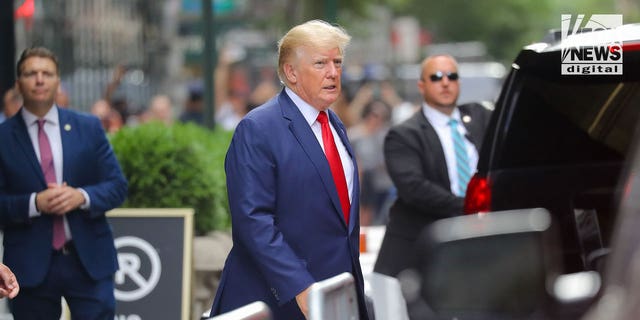By Brooke Singman , David Spunt , Bill Mears , Tyler Olson | Fox News
Special master will review records seized in FBI raid of Trump's home
A federal judge ordered Monday that an independent special master be appointed to review the records seized by the FBI during its raid of former President Trump's Mar-a-Lago home and ordered the Justice Department stop its own review of the material for investigative purposes.
U.S. District Judge from the Southern District of Florida Judge Aileen M. Cannon ordered that the special master be appointed to "review the seized property, manage assertions of privilege and make recommendations thereon, and evaluate claims for return of property."
"The Court hereby authorizes the appointment of a special master to review the seized property for personal items and documents and potentially privileged material subject to claims of attorney-client and/or executive privilege," the order states.
Fox News first reported last month that FBI agents seized boxes containing records covered by attorney-client privilege and potentially executive privilege during the raid.
Attorney-client privilege refers to a legal privilege that keeps communications between an attorney and their client confidential. It is unclear, at this point, if the records include communications between the former president and his private attorneys, White House counsel during the Trump administration or a combination.
A Department of Justice "taint" or "filter" team had been reviewing those documents, but Cannon's Monday order temporarily halts that review.
"Furthermore, in natural conjunction with that appointment, and consistent with the value and sequence of special master procedures, the Court also temporarily enjoins the Government from reviewing and using the seized materials for investigative purposes pending completion of the special master’s review or further Court order."
The order, though, "shall not impede the classification review and/or intelligence assessment by the Office of the Director of National Intelligence ("ODNI") as described in the Government’s Notice of Receipt of Preliminary Order."
Trump's legal team last month asked Cannon to appoint a special master in the wake of the unprecedented search of his property, arguing that the DOJ's "Privilege Review Team" should not be the final arbiter of whether its actions were proper in such a high-profile case and that the review team's scope was too narrow.
"We need to take a deep breath. These are presidential records in the hands of the 45th president at a place which was used frequently for work during his presidency," Trump attorney Christopher Kise said in a hearing Thursday.
Meanwhile, federal prosecutors during the hearing last week argued that appointing a special master would delay their investigation, that Trump didn't have standing for his request and that he didn't have a right to possess the classified documents.
"He is no longer the president, and because he is not … he was unlawfully in possession of them," DOJ attorney Jay Bratt said of the documents the FBI took from Trump's home.
A more detailed list of documents taken from Trump's home revealed that dozens of highly classified documents, and even empty folders with classified markings, were among the items the FBI seized.
"Some of those records included the most highly classified records in the U.S. There was no place at that property [Mar-a-Lago] that was authorized for those records," DOJ prosecutor Julie Edelstein said Thursday.
Cannon's ruling came after she declined to rule on the request from the bench at a Thursday hearing over Trump's motion. The judge said then she would announce her ruling "in due course."
Cannon did, however, indicate that she was leaning toward appointing a special master.
Last week, Cannon announced in an order her "preliminary intent" to grant Trump's request. And she seemed skeptical of some of the government's arguments in Thursday's hearing.
"What is the harm of appointing a special master?" she said. "What is your articulation of harm other than the general concern that it would delay a criminal investigation?"
The government conducted the initial search of Trump's home in response to what it believes to be a violation of federal laws: 18 USC 793 — gathering, transmitting or losing defense information; 18 USC 2071 — concealment, removal or mutilation; and 18 USC 1519 — destruction, alteration or falsification of records in Federal investigations.
Attorney General Merrick Garland said he personally approved the search of Trump's home.
_______________
RELATED ARTICLE
What about Hillary's obstruction?
BY JONATHAN TURLEY | Hot Air.com
Later, more classified material was found on the laptop of former congressman Anthony Weiner (D-N.Y.), who was married to top Clinton aide Huma Abedin — 49,000 emails potentially relevant to the Clinton investigation.
After Congress sought these emails, Clinton’s staff unilaterally destroyed thousands of emails with BleachBit. Clinton was aware that Congress and the State Department were seeking the emails in 2014. Her lawyers turned over about 30,000 work-related emails to the State Department and deleted 33,000 others while insisting they unilaterally deemed them “personal.” …
With Hillary Clinton selling “But Her Emails” hats at $30 a pop, Merrick Garland will have to explain the prospect of one politician going to jail while the other goes retail.
https://hotair.com/headlines/2022/09/04/what-about-hillarys-obstruction-n494410





